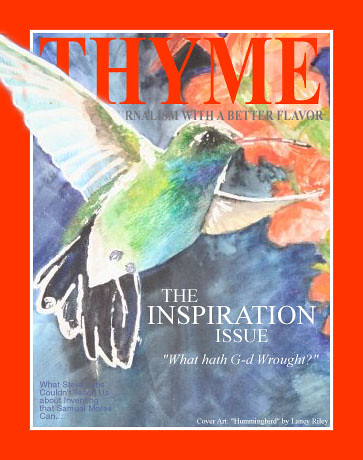
Volume VI, Issue XI
"What Hath G-d Wrought"
A 'Best of THYMEs' Feature...
The 'other' Weekly News Magazine [click to read] once featured The Invention Issue. We noticed very quickly that the featured 'hummingbird drone' and other best inventions of the year share the quality of being inspired by unique things in nature. Thus THYME presents: The Inspiration Issue.
When Samuel Morse invented the telegraph, he keyed "What hath G-d wrought" as the first words transmitted over the new device. When Bell invented the telephone, his "Mr. Watson, come here. I need you." seems anticlimactic. Still, there is much evidence of modern innovators who were more than willing to give credit where credit was due when it came to their unique inspiration.
Consider the story of the great industrialist, Robert G. LeTourneau. During the war he was given the task by the government to design a large piece of equipment to move airplanes. He literally was given a contract to build a device that had never been built before. He and his crack staff of engineers went to work on the problem and found themselves hopelessly overwhelmed by the task before them. With the deadline looming large before them, and his staff at the point of frustration, LeTourneau got up from his work group. It was Wednesday night, he said, and he was going to prayer meeting.
"You can't do that, boss," one fellow blurted out; "We've got a deadline on this thing!"
LeTourneau's response must have stunned his men: "But I've got a deadline with G-d!"
LeTurneau went to prayer meeting. He prayed, sang hymns and left his problems in the hands of one far greater than himself. He says that as he walked home that night, details of the machine he needed to build came into his mind in vivid and complete pictures.
Every great invention of mankind began as an idea in someone's mind. Likely the idea was the result of some new perspective gained by observation. One of the great joys of teaching young people to draw is to watch them teach themselves deeper levels of observation... and yes, they teach themselves. You can create the opportuity for a student to learn, but you defeat your own purpose if you "see" for them in this exercise.




No comments:
Post a Comment